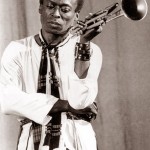10 Years of the Commons: Helldriver’s Pit Stop!
 “This blog is partly an exercise in self-examination and cultural analysis (as all personal narrative is). Second, they will rely heavily on those tried-and-true crutches of music writing, image and metaphor. And finally, as someone with an evolving literacy in a variety of musical genres (rock, jazz, classical, flamenco, and Latin), and some familiarity with the persons and recordings who/that have shaped these genres—and as someone with at least the rudiments of music theory haphazardly taught to him in the distant past—I will not shy away from either historical or musicological speculation when it seems warranted. Above all, and whenever possible, I will try to be shamelessly exuberant (for, as Blake said, “exuberance is beauty”), and will occasionally make unwarranted, peurile exclamations of like or dislike for some musician, band, piece, or composer. (This is a blog, after all, no apologies are necessary.) All this to say: Don’t expect very much light from this blog … but do enjoy the heat, while it lasts.” – Craig Bernardini on the purpose of Helldriver’s Pit Stop
“This blog is partly an exercise in self-examination and cultural analysis (as all personal narrative is). Second, they will rely heavily on those tried-and-true crutches of music writing, image and metaphor. And finally, as someone with an evolving literacy in a variety of musical genres (rock, jazz, classical, flamenco, and Latin), and some familiarity with the persons and recordings who/that have shaped these genres—and as someone with at least the rudiments of music theory haphazardly taught to him in the distant past—I will not shy away from either historical or musicological speculation when it seems warranted. Above all, and whenever possible, I will try to be shamelessly exuberant (for, as Blake said, “exuberance is beauty”), and will occasionally make unwarranted, peurile exclamations of like or dislike for some musician, band, piece, or composer. (This is a blog, after all, no apologies are necessary.) All this to say: Don’t expect very much light from this blog … but do enjoy the heat, while it lasts.” – Craig Bernardini on the purpose of Helldriver’s Pit Stop
Hello, members of the CUNYverse!
In continuation of the CUNY Academic Commons 10-Year Anniversary blog series, we are going to be looking at some content from a universally appreciated Commons fan favorite: Helldriver’s Pit Stop! Helldriver’s Pit Stop was founded by Craig Bernardini, also known by his Commons alias “Helldriver,” back in the first few months of the CUNY Commons’ initial release. Craig established his now 20+ year-long relationship with CUNY when he started teaching at John Jay College of Criminal Justice in 1998, but he now works as an Associate Professor of English at Hostos Community College. The reason the introductory quote above is a lengthy one is because I feel as though Craig’s consistent blogging on Helldriver’s Pit Stop throughout the years reflected how the CUNY Academic Commons was a space for unapologetic self-expression. Similar to the ideas explored in a recent InCommon article from early January 2020, Passion Projects on the Commons: A Discussion with Michael Branson Smith!, Craig utilized the Commons for personal exploration/reflection through music, in a strikingly similar way that Michael Branson Smith has done so with art.
Are you still asking yourself “But why blog on the Commons?” Have we not convinced you yet that this is the place for your hobbies and other interests? Well, conveniently, Craig himself addressed this question when he created the Helldriver’s Pit Stop introductory post back in March 2010, and it still holds true today:
 “The blog seems like an ideal space, to borrow Gunther Schuller’s pun, for musing. In many ways, the blog seems not so different from writing for a circle of friends, even as that circle is necessarily much wider. In a blog I don’t feel like I have the pressure to craft something finished, to speak as an academic from a fortress of authority, to contribute anything to a field. I don’t feel that I have to account for what has already been said about (say) Miles Davis, or Bela Bartok, or Tool. Hell, I don’t even have to have a goddamn thesis if I don’t want to (though I will certainly try, good little academic writer that I am).”
“The blog seems like an ideal space, to borrow Gunther Schuller’s pun, for musing. In many ways, the blog seems not so different from writing for a circle of friends, even as that circle is necessarily much wider. In a blog I don’t feel like I have the pressure to craft something finished, to speak as an academic from a fortress of authority, to contribute anything to a field. I don’t feel that I have to account for what has already been said about (say) Miles Davis, or Bela Bartok, or Tool. Hell, I don’t even have to have a goddamn thesis if I don’t want to (though I will certainly try, good little academic writer that I am).”
-Craig Bernardini/Helldriver on the self-imposed question “Why NOT blog?”
Craig ended the intro to this historic blog by explaining that it provided him with an incentive to keep writing. While teaching a “Writing About Music” course at Hostos, he asks students to keep a listening diary so that they remained immersed in the topic, so why not lead through example via Helldriver’s Pit Stop? Alright, let us take a look at some memorable quotes from the site through the years:
“From the second handicapped parking spot I could already hear the music, some song by Los Rolling I didn’t recognize; and now here I am, jutting my chin to Mick and the gang as I dig through the
 cornucopia of snack mixes—Tempting Trail Mix, Go Raw Trek Mix, Rainbow’s End Trail Mix—in the guiltless banana republic, the outpost of some sunny SoCal empire, that is Trader Joe’s. Shopping here is a cross between safari and beach vacation; I feel a tiny bit colonial, but innocently so. Perhaps it’s because every aspect of the experience is as managed as a Disneyworld ride, up to and including the adorable hippies in Hawaiian shirts carrying signs the size of butterfly nets and restocking shelves with Trader Joe’s products, or one of its cutesy ethnic variants, as recognizably Traders Joe as the Lone Ranger with that teensy-weensy mask stretched over his eyes. The employees at the registers seem a bit too old to be working here, and a bit too cheerful. In fact—again reminding me of Disney—everyone is a bit too cheerful, to the point of seeming a little on edge, so that I can’t help but scan their eyeballs for an amphetamine shiver. And maybe that’s why, despite the crate-and-burlap kitsch of the decor and the lockstep branding of the products and the Pangloss vibe of the staff, shopping here carries a whiff of adventure, of potential danger.”
cornucopia of snack mixes—Tempting Trail Mix, Go Raw Trek Mix, Rainbow’s End Trail Mix—in the guiltless banana republic, the outpost of some sunny SoCal empire, that is Trader Joe’s. Shopping here is a cross between safari and beach vacation; I feel a tiny bit colonial, but innocently so. Perhaps it’s because every aspect of the experience is as managed as a Disneyworld ride, up to and including the adorable hippies in Hawaiian shirts carrying signs the size of butterfly nets and restocking shelves with Trader Joe’s products, or one of its cutesy ethnic variants, as recognizably Traders Joe as the Lone Ranger with that teensy-weensy mask stretched over his eyes. The employees at the registers seem a bit too old to be working here, and a bit too cheerful. In fact—again reminding me of Disney—everyone is a bit too cheerful, to the point of seeming a little on edge, so that I can’t help but scan their eyeballs for an amphetamine shiver. And maybe that’s why, despite the crate-and-burlap kitsch of the decor and the lockstep branding of the products and the Pangloss vibe of the staff, shopping here carries a whiff of adventure, of potential danger.”
– Helldriver’s intro to the music playing in a Trader Joe’s
“Miles settles and rolls, never strains or trembles, hoeing that straight, simple line (for a hoe in the  hands of an experienced farmer is as expressive a tool as a jazzman’s horn). Wherever he moves—and he never really stops moving—he’s always at home. Such grace and poise and confidence, even in those growled mother*******. The result doesn’t sound like improvisation; it has more the feeling of sculpture; even as it unfolds in time, it has a spatial, plastic quality, as if, after he were done, you could hold the entire solo in your hands, turning it; or as if, while listening, you were walking not with but around it. You appreciate it as a whole, even though you can never hear it all at once. Sonny Rollins has been credited with introducing this sort of structural unity to the jazz solo. But I can’t imagine Rollins without Miles; there is the same seeming inevitability of choice about both men’s playing.”
hands of an experienced farmer is as expressive a tool as a jazzman’s horn). Wherever he moves—and he never really stops moving—he’s always at home. Such grace and poise and confidence, even in those growled mother*******. The result doesn’t sound like improvisation; it has more the feeling of sculpture; even as it unfolds in time, it has a spatial, plastic quality, as if, after he were done, you could hold the entire solo in your hands, turning it; or as if, while listening, you were walking not with but around it. You appreciate it as a whole, even though you can never hear it all at once. Sonny Rollins has been credited with introducing this sort of structural unity to the jazz solo. But I can’t imagine Rollins without Miles; there is the same seeming inevitability of choice about both men’s playing.”
-Helldriver on the healing qualities of Miles Davis
“There is no music in Siddhartha, at least that I recall. Others of Hesse’s novels—Steppenwolf, The Glass-Bead Game—are steeped in music. But Siddhartha comes to me from the farther reaches of memory as a silent book, or no more aural than the soundscape of, say, the river itself. The ferryman has mastered the art of listening to others speak. Would the same hold true for music? If so, would it not be lovely for a fiddler to bring his fiddle onto that ferry, a guitarist her guitar? There he would be, the one true listener, a sufficient audience unto himself.”
-Helldriver on the musical potential of the ferryman from Hesse’s Siddhartha
As you can see, much like the scholars of the CUNY Pie group, Craig finds a way to write about his experiences interacting with music and the world through our open network that is the CUNY Commons. People come to the blog, read, and respond to his posts, resulting in an entire community interested in his humor and cultural analysis of how we engage with these tunes. Craig still posts from time to time, so go check out Helldriver’s Pit Stop and enjoy the copious amounts of content available!
Let us know what some of your favorite Commons groups/sites have been over the years by clicking here!
Best,
Anthony





Just saw this. A big thanks for the shout out! I feel deeply honored! I want my cake!
One small correction: I am no longer department chair. My tenure ended in 2015. I was succeeded by the wonderful Prof. Gregory Marks, who was himself succeeded by the wonderful Prof. Andrea Fabrizio, our current chairperson.
To the death!! (-Voivod)
HD
Correction made! Thanks, Helldriver!